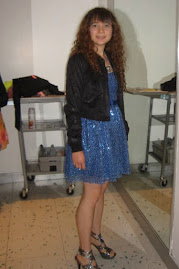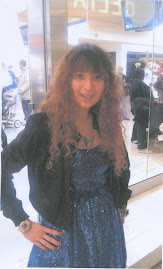Since Marisa graduated in June of 2011, she has joined a gym where she manages to work out a few times a week, participates in Special Olympics and is employed at 2 jobs that she enjoys immensely. Knowing that young people coming out of school are struggling to find jobs, it is truly a blessing that she is able to be gainfully and happily employed. But the best part about this is that having these jobs has boosted Marisa's confidence and self esteem. It has given her the chance to prove that she is a responsible young adult. She has shown me in numerous ways that she is quite capable of anything she puts her mind to.
For example, walking in to a store with the intention of purchasing a particular item, Marisa will go straight up to a sales associate, pull out a picture of the item she is looking for, and ask where it is in the store. Recently, Marisa's support staff Kathy, informed me that Marisa surprised her with a response to a sales associate in a store. The sales associate told Marisa there were no more of her requested item in stock. Marisa was not satisfied. Why? The sales associate hadn't even gone to look in the stock room. How could she know for sure? Marisa immediately approached another sales associate and asked her the same question. This sales girl promptly went to check the back stockroom, and to Marisa's delight produced the requested item! How many of us would have been that persistent? We might have felt foolish to approach another sales person in the store. After all, the first one clearly stated that they were out of the item. Perhaps it was intuition on Marisa's part or just sensing that the first sales person couldn't care less or was too busy to help out. I can't be sure what Marisa was thinking. But there is one thing I do know for sure.
Marisa, being employed in a retail store, learned that the customer is supposed to be treated in a friendly, helpful manner. If all customers were treated the way the first sales associate had treated Marisa, the chances are the store would send the customers running. That is something she learned from being employed. She learned that a customer should always be treated courteously and given the time and attention they deserve. After all, without paying customers, the stores would go out of business.
Not only did Kathy notice this polite but persistent approach when out shopping with Marisa, but I noticed it as well. Marisa has become a patient and methodical shopper. If an item is not in stock, she will ask when it is going to come in again, and will check back with the store at the designated date.
I have also seen other benefits as a result of Marisa's employment. Just the other day I was headed in to my laundry room to take the bath towels out of the drier. But there they were, already folded neatly on the counter. How did that happen? When did I fold these? I have no memory of doing this, but they're folded exactly the way I would fold them! I thought. Then it occurred to me that perhaps Marisa had done it. I decided to ask.
"I folded them because I needed to put my laundry in the drier," she answered.
Why was I not surprised? Marisa had learned to fold clothing so perfectly while working in the clothing store. Of course she was able to fold the towels! It really had become no big deal. Where previously she would have asked me to remove my towels so she could use the drier, she realized it would be quicker and more efficient to just do it herself. Her goal was to get her job done, even if it meant doing some of my job.
Then the other day Marisa and I were preparing one of the new recipes she had given me. There were numerous steps involved in this Spicy Macaroni and Cheese recipe. It wasn't anything like my standard 5 ingredient macaroni and cheese that takes 5 minutes to throw together.
"You have a recreation program in an hour. There's no way you can get this done, eat it and get to the program in time," I said. "Would you like to skip this recipe and eat something quick?"
I expected Marisa to grit her teeth and do an anger dance to express the turmoil in her head. She usually could not accept having to choose between two activities, expecting that somehow she would have to do it all no matter if there wasn't enough time. There was silence now as she was thinking out this problem ... searching for a solution. I waited. Then ...
"I'll skip the program. I don't need to do a holiday craft," she replied. I looked at her as she busied herself at the stove.
"Are you sure?" I asked. "You could go a little late," I suggested.
"That's all right," she answered. "I'll work on the dinner instead."
Pleasantly surprised at the ease with which she made her decision, I thought about how mature she had become. Was it the responsibility of her jobs that had helped her? Was it the ability to problem solve that comes from being in a work environment or was this just normal maturation? I can't say for sure, but one thing is certain. Every working experience in life contributes to growth. Whether it is through a paying job or through volunteering for a worthy cause, there is an intrinsic reward for one's efforts. That reward is knowing that we are all able to be contributing members of the society in which we live. Realizing that in itself is a wonderful thing! May we all continue to learn, be happy and productive in the new year!
For example, walking in to a store with the intention of purchasing a particular item, Marisa will go straight up to a sales associate, pull out a picture of the item she is looking for, and ask where it is in the store. Recently, Marisa's support staff Kathy, informed me that Marisa surprised her with a response to a sales associate in a store. The sales associate told Marisa there were no more of her requested item in stock. Marisa was not satisfied. Why? The sales associate hadn't even gone to look in the stock room. How could she know for sure? Marisa immediately approached another sales associate and asked her the same question. This sales girl promptly went to check the back stockroom, and to Marisa's delight produced the requested item! How many of us would have been that persistent? We might have felt foolish to approach another sales person in the store. After all, the first one clearly stated that they were out of the item. Perhaps it was intuition on Marisa's part or just sensing that the first sales person couldn't care less or was too busy to help out. I can't be sure what Marisa was thinking. But there is one thing I do know for sure.
Marisa, being employed in a retail store, learned that the customer is supposed to be treated in a friendly, helpful manner. If all customers were treated the way the first sales associate had treated Marisa, the chances are the store would send the customers running. That is something she learned from being employed. She learned that a customer should always be treated courteously and given the time and attention they deserve. After all, without paying customers, the stores would go out of business.
Not only did Kathy notice this polite but persistent approach when out shopping with Marisa, but I noticed it as well. Marisa has become a patient and methodical shopper. If an item is not in stock, she will ask when it is going to come in again, and will check back with the store at the designated date.
I have also seen other benefits as a result of Marisa's employment. Just the other day I was headed in to my laundry room to take the bath towels out of the drier. But there they were, already folded neatly on the counter. How did that happen? When did I fold these? I have no memory of doing this, but they're folded exactly the way I would fold them! I thought. Then it occurred to me that perhaps Marisa had done it. I decided to ask.
"I folded them because I needed to put my laundry in the drier," she answered.
Why was I not surprised? Marisa had learned to fold clothing so perfectly while working in the clothing store. Of course she was able to fold the towels! It really had become no big deal. Where previously she would have asked me to remove my towels so she could use the drier, she realized it would be quicker and more efficient to just do it herself. Her goal was to get her job done, even if it meant doing some of my job.
Then the other day Marisa and I were preparing one of the new recipes she had given me. There were numerous steps involved in this Spicy Macaroni and Cheese recipe. It wasn't anything like my standard 5 ingredient macaroni and cheese that takes 5 minutes to throw together.
"You have a recreation program in an hour. There's no way you can get this done, eat it and get to the program in time," I said. "Would you like to skip this recipe and eat something quick?"
I expected Marisa to grit her teeth and do an anger dance to express the turmoil in her head. She usually could not accept having to choose between two activities, expecting that somehow she would have to do it all no matter if there wasn't enough time. There was silence now as she was thinking out this problem ... searching for a solution. I waited. Then ...
"I'll skip the program. I don't need to do a holiday craft," she replied. I looked at her as she busied herself at the stove.
"Are you sure?" I asked. "You could go a little late," I suggested.
"That's all right," she answered. "I'll work on the dinner instead."
Pleasantly surprised at the ease with which she made her decision, I thought about how mature she had become. Was it the responsibility of her jobs that had helped her? Was it the ability to problem solve that comes from being in a work environment or was this just normal maturation? I can't say for sure, but one thing is certain. Every working experience in life contributes to growth. Whether it is through a paying job or through volunteering for a worthy cause, there is an intrinsic reward for one's efforts. That reward is knowing that we are all able to be contributing members of the society in which we live. Realizing that in itself is a wonderful thing! May we all continue to learn, be happy and productive in the new year!








